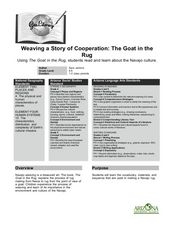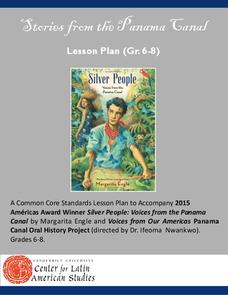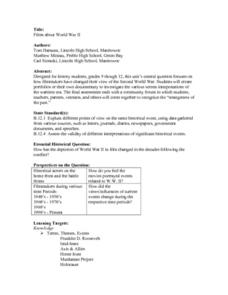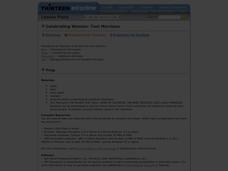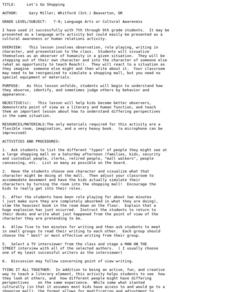Curated OER
Narrative of the Life of Frederick Douglass by Frederick Douglass
Imagine what it was like to be a slave in the United States in 1845. Eighth graders are given an opportunity to experience life from the point of view of Frederick Douglass as they read and discuss an annotated passage from Narrative of...
Curated OER
In God We Trust; All Others Pay Cash
Learners review their knowledge on the First Amendment. After reading an article, they identify specific church and state issues. Using the Internet, they research President Bush's proposal from a specific point of view. They summarize...
Los Angeles Unified School District
Capitalism and Socialism
Capitalism, socialism, communism ... these may seem like a whole bunch of isms to your scholars. High schoolers won't confuse them after completing an informative resource. Your class masters how to use primary sources to critically...
Curated OER
Weaving a Story of Cooperation: The Goat in the Rug
Weaving is an important part of Navajo culture. Read The Goat in the Rug to your fourth and fifth graders, and give them a glimpse into the process of rug making from the point of view of a goat! They will learn new vocabulary words and...
Channel Islands Film
Santa Cruz Island - Visible Thinking Routines
Visible Thinking Routines are designed to help learners deepen their understanding of what they are learning and enable them to communicate their understanding of concepts to others. Individuals adopt one of these routines to use to...
Digital Public Library of America
Frederick Douglass and Abraham Lincoln
Frederic Douglass and Abraham Lincoln, although dissimilar in their backgrounds, were united in their views about slavery. A set of 14 primary sources permits scholars to examine the views of these two powerful men.
Curated OER
Quality of Information: Point of View and Bias
Fifth graders identify stereotypes of Indian people based on perceived characteristics. They discuss the misconceptions. Students define quality of information and give an example from the story "Seaman's Journal: On The Trail With Lewis...
Roy Rosenzweig Center for History and New Media
War and Poetry
A band of brothers or the Devil's agents? Nobel warriors freeing the oppressed or mercenaries working for the military/industrial complex? Groups examine poems from the Civil War, World War I, and World War II to determine the poets'...
Ford's Theatre
How Perspective Shapes Understanding of History
The Boston Massacre may be an iconic event in American history, but perhaps the British soldiers had another point of view. Using primary sources, including reports from Boston newspapers and secondary sources from the British...
North Carolina Consortium for Middle East Studies
The French and Indian War: The War That Shaped America’s Destiny
How would a Frenchman, Englishman, and Native American have each viewed the French and Indian War? Your young historians will learn about their unique perspectives and the war as a whole through a role-playing activity, engaging...
Annenberg Foundation
Gothic Undercurrents
Terror, mystery, excitement. American writers of the 19th century, including Nathaniel Hawthorne, Herman Melville, and Emily Dickinson, used these elements to create morally ambiguous tales that challenged the prevailing belief in...
Vanderbilt University
Stories from the Panama Canal
The stories of the Silver People, the West Indies immigrants hired to work on the Panama Canal, come to life in a lesson about the building of the Panama Canal. Groups research why the canal was built, how it was build, the working...
Curated OER
Friar Margil & The Spanish Missions
Young scholars explore the life of Friar Margil de Jesus as well as other Spanish friars. They research Friar Margil and write a paragraph explaining why Spanish friars came to Texas. In groups, students create a PowerPoint presentation...
Curated OER
Films About World War II
Ninth graders focus on how filmmakers have changed their view of the Second World War. They create portfolios or their own documentary to investigate the various screen interpretations of the wartime era and explain different points of...
Curated OER
For the Record
Students read a New York Times article in order to examine the importance of cultural artifacts. They create essays from the point of view of one cultural artifact to demonstrate the knowledge they gained by doing research.
Curated OER
Desert Views: First Impressions
Pupils are introduced to primary source material and the ways in which early travelers viewed aspects of the desert environment. The lesson addresses the geography themes of location, region, and human/environment interaction.
J. Paul Getty Trust
Exhibiting Common Threads
Artists working in different media often explore the same themes—to model how these same themes weave their way through different forms of artistic expression, scholars analyze images by Dorothea Lange, identifying key themes in her...
Curated OER
THE OCCUPATION OF KOREA BY JAPANESE IMPERIALIST FORCES
Students read and respond to a history of Korea. In this occupation lesson, students work in groups to research the effects of Japanese occupation and create an illustrated timeline. Students listen to a lecture and write an acrostic....
Curated OER
Lesson: Storyboarding Revolution
Kids consider revolution as a basis for creativity, art, and storytelling. After reading an excerpt from the book, Persepolis, learners choose one event from any world revolution to write about. They storyboard the event focusing on...
Digital Public Library of America
African American Soldiers in World War I
Finding good primary source materials to support any study of history can be a challenge and time-consuming. A set of 11 primary source letters, images, and text excerpts provide young historians with an opportunity to sharpen their...
Curated OER
Celebrating Women: Toni Morrison
How authors address issues of their societies is addressed in this very detailed lesson. After researching Toni Morrison and her work, groups create a dramatization based on a scene from one of Morrison’s novels and act it out. Class...
Japan Society
Akutagawa Ryunosuke and the Taisho Modernists
Japan's Taisho Period was a time when authors like Akutagawa and other Japanese modernists began to experiment with point of view and literary form, making the literature produced during this time period a natural choice for teaching...
Curated OER
If You Lived at the Time of the Civil War.
Students investigate major characters of history that are represented in children's literature. They conduct research using a variety of resources and each character is put into a class book as a presentation. The character includes a...
Curated OER
Let's Go Shopping
Students explore how to become better observers, demonstrate point of view as a literary and human function, and learn an important instructional activity about how to explain differing perspectives in the same situation.
Other popular searches
- Author's Point of View Media
- Authors Point of View Media
- Authors View Point
- Author's View Point
- Author's "Point of View" Media





